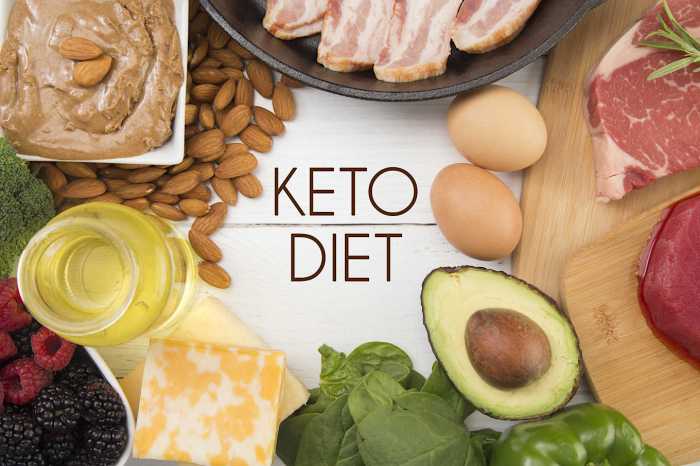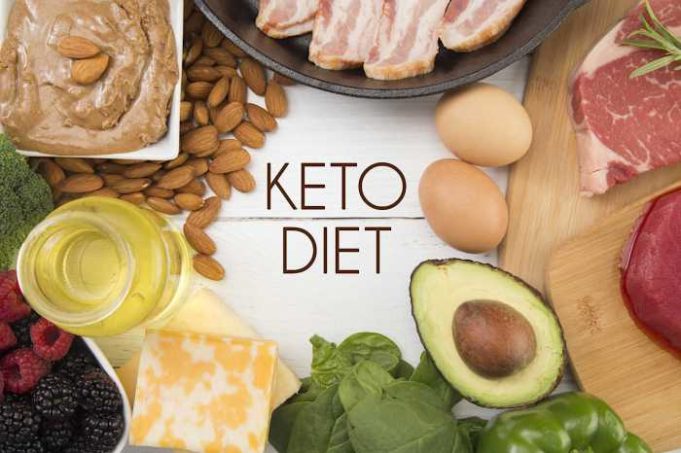Is a keto diet good for high cholesterol? This question has sparked debate among health enthusiasts and professionals alike. The ketogenic diet, known for its high-fat, low-carbohydrate approach, has gained popularity for its potential weight loss benefits. But how does it affect cholesterol levels, particularly in individuals with high cholesterol?
Understanding the potential impact of a keto diet on cholesterol requires delving into the different types of cholesterol and their roles in the body. This article will explore the mechanisms behind the keto diet’s effects on cholesterol, examining both the potential benefits and risks for individuals with high cholesterol. We’ll also discuss the importance of consulting a healthcare professional before adopting any drastic dietary changes.
Keto Diet Basics
The ketogenic diet, often referred to as the keto diet, is a high-fat, very low-carbohydrate eating plan that forces the body to enter a metabolic state called ketosis. This dietary approach aims to shift the body’s primary energy source from glucose (sugar) to ketones, which are produced from the breakdown of fat.
Metabolic Shift to Ketosis
The keto diet restricts carbohydrates to a very low level, typically around 20-50 grams per day. This restriction forces the body to deplete its glycogen stores, which are the body’s primary source of glucose. As glucose levels decline, the body begins to break down stored fat into ketones, which can then be used as fuel by the brain and other tissues.
The process of ketosis involves the breakdown of fat into ketones, specifically beta-hydroxybutyrate (BHB), acetoacetate, and acetone. These ketones are then used as an alternative energy source by the body.
Sample Ketogenic Meal Plan, Is a keto diet good for high cholesterol
A typical ketogenic meal plan emphasizes high-fat foods, moderate protein intake, and very low carbohydrate intake. Here’s a sample meal plan for a day:
- Breakfast: 2 eggs with 2 slices of bacon and a cup of unsweetened coffee or tea.
- Lunch: Salad with grilled chicken or fish, avocado, and a dressing made with olive oil and vinegar.
- Dinner: Salmon with roasted broccoli and a side of cauliflower rice.
- Snacks: Nuts, seeds, cheese, or a keto-friendly protein bar.
Cholesterol and the Keto Diet
Cholesterol is a waxy, fat-like substance that’s essential for the body to function properly. It’s found in all cell membranes and is used to make hormones, vitamin D, and bile acids. While cholesterol is crucial, having too much of it can lead to health problems, particularly cardiovascular disease.
Types of Cholesterol and Their Roles
Cholesterol is often categorized into two main types:
- Low-density lipoprotein (LDL), often referred to as “bad” cholesterol, can build up in the arteries, leading to plaque formation and narrowing of the blood vessels. This can increase the risk of heart attacks and strokes.
- High-density lipoprotein (HDL), known as “good” cholesterol, helps remove LDL from the bloodstream and transport it to the liver for processing. Higher HDL levels are associated with a lower risk of heart disease.
Impact of a Ketogenic Diet on Cholesterol Levels
A ketogenic diet, which emphasizes high fat, moderate protein, and very low carbohydrate intake, can have a significant impact on cholesterol levels.
- Increased HDL Levels: Studies have shown that the ketogenic diet can lead to an increase in HDL levels. This beneficial effect is likely due to the diet’s high fat content and its ability to improve insulin sensitivity.
- Mixed Effects on LDL Levels: The impact of the keto diet on LDL levels is less clear-cut. Some studies have shown that LDL levels can increase, while others have observed no significant changes or even decreases. This variability may be influenced by individual factors, such as genetics, starting cholesterol levels, and the duration of the diet.
Research Findings on Keto Diets and Cholesterol
Several studies have investigated the effects of ketogenic diets on cholesterol profiles in individuals with high cholesterol. Some notable findings include:
- A 2018 study published in the journal “Nutrients” found that a ketogenic diet significantly reduced total cholesterol, LDL cholesterol, and triglycerides in overweight and obese individuals with metabolic syndrome.
- Another study, published in the “Journal of the American College of Nutrition” in 2017, observed that a ketogenic diet improved lipid profiles, including a reduction in LDL cholesterol and an increase in HDL cholesterol, in individuals with high cholesterol.
Potential Benefits of Keto for High Cholesterol
While the ketogenic diet is not a magic bullet for high cholesterol, it can offer potential benefits by influencing various metabolic pathways. Understanding these benefits can help individuals make informed decisions about incorporating keto into their cholesterol management plan.
Impact on Insulin Resistance and Inflammation
Insulin resistance, a condition where the body doesn’t respond properly to insulin, is often linked to high cholesterol. The keto diet, by reducing carbohydrate intake and promoting fat burning, can improve insulin sensitivity. This improvement can contribute to lower cholesterol levels by reducing the production of triglycerides, a type of fat associated with elevated cholesterol.
Furthermore, the keto diet’s anti-inflammatory properties can also benefit cholesterol levels. Inflammation can increase the risk of cardiovascular disease, a major concern for individuals with high cholesterol. By reducing inflammation, the keto diet may contribute to a healthier cardiovascular system.
Impact on Blood Sugar Control
The keto diet’s ability to improve blood sugar control can also positively impact cholesterol levels. When blood sugar levels are well-managed, the body is less likely to produce excessive amounts of triglycerides, which can contribute to high cholesterol. The keto diet’s focus on low-carbohydrate intake helps stabilize blood sugar levels, potentially reducing the risk of developing high cholesterol.
Impact on Weight Loss
Weight loss is often a crucial factor in managing high cholesterol. The keto diet’s emphasis on fat intake and restriction of carbohydrates can promote weight loss, which can lead to improvements in cholesterol levels. The mechanism behind this is that losing weight often reduces the production of LDL cholesterol, the “bad” cholesterol, and increases HDL cholesterol, the “good” cholesterol.
Potential Risks and Considerations: Is A Keto Diet Good For High Cholesterol

While the keto diet can be beneficial for some individuals with high cholesterol, it’s crucial to be aware of its potential downsides. Like any restrictive diet, the ketogenic diet carries certain risks that need to be considered before making a commitment.
Potential Nutrient Deficiencies
A ketogenic diet emphasizes fat consumption and significantly restricts carbohydrate intake. This can lead to potential nutrient deficiencies, as many essential nutrients are found in carbohydrates, fruits, and vegetables.
- Fiber: A lack of fiber in a keto diet can contribute to digestive issues, such as constipation.
- Vitamins and Minerals: Essential vitamins and minerals like vitamin C, potassium, and magnesium are often found in fruits and vegetables, which are limited on a keto diet.
It’s important to be mindful of these potential deficiencies and ensure you’re getting adequate nutrients through other sources, such as supplements or carefully selected keto-friendly foods.
Potential for Kidney Stones
A ketogenic diet can increase the risk of kidney stones in some individuals.
- Increased Urinary Oxalate: The keto diet can lead to increased urinary oxalate levels, a key component of kidney stones.
- Dehydration: The keto diet often results in increased fluid loss, which can contribute to the formation of kidney stones.
Staying adequately hydrated and monitoring oxalate intake are crucial for mitigating this risk.
Importance of Consulting a Healthcare Professional
Before adopting a ketogenic diet, particularly for individuals with existing health conditions, it’s essential to consult a healthcare professional. They can assess your individual needs, potential risks, and provide personalized guidance.
“Individuals with pre-existing medical conditions, such as diabetes, kidney disease, or liver disease, should consult with their healthcare provider before starting a ketogenic diet.”
A healthcare professional can also help monitor your progress, address any potential side effects, and ensure you’re getting the necessary nutrients.
Potential Side Effects
While the keto diet can be effective for some, it can also lead to side effects, particularly during the initial adaptation phase.
- Keto Flu: This common side effect can manifest as fatigue, headaches, nausea, and constipation. It typically occurs within the first few days or weeks of starting the keto diet.
- Electrolyte Imbalances: The keto diet can cause electrolyte imbalances, especially in sodium, potassium, and magnesium. These imbalances can contribute to fatigue, muscle cramps, and headaches.
It’s crucial to listen to your body and gradually adapt to the keto diet to minimize these side effects.
Long-Term Sustainability
While a ketogenic diet can be effective for short-term weight loss and cholesterol management, its long-term sustainability can be a challenge. The restrictive nature of the diet and its potential for social limitations may make it difficult to maintain over an extended period.
Individualized Approaches and Lifestyle Modifications
The key to long-term success with a ketogenic diet lies in adopting an individualized approach that considers personal preferences and lifestyle factors. While dietary changes are essential, incorporating lifestyle modifications can significantly enhance sustainability. These modifications include:
- Regular physical activity: Exercise not only helps with weight management but also improves insulin sensitivity, which can be beneficial for cholesterol levels.
- Stress management techniques: Chronic stress can negatively impact cholesterol levels. Practicing stress-reducing activities like yoga, meditation, or spending time in nature can be beneficial.
- Adequate sleep: Getting enough sleep is crucial for overall health and can contribute to better cholesterol management.
Incorporating Healthy Fats and Protein Sources
A ketogenic diet emphasizes healthy fats and protein sources. Here are some tips for incorporating these into a sustainable keto lifestyle:
- Choose healthy fats: Focus on monounsaturated and polyunsaturated fats found in olive oil, avocados, nuts, and fatty fish. These fats can help lower LDL (bad) cholesterol and raise HDL (good) cholesterol.
- Prioritize lean protein: Include lean protein sources like chicken, fish, turkey, and tofu in your meals. These proteins provide essential nutrients and can help you feel full and satisfied.
- Explore different keto-friendly recipes: There are numerous keto-friendly recipes available that can help you stay engaged and prevent boredom. Experiment with different flavors and cuisines to keep things interesting.
Concluding Remarks
In conclusion, while a ketogenic diet may offer potential benefits for managing high cholesterol, it’s crucial to approach it with caution and under the guidance of a healthcare professional. The diet’s impact on cholesterol levels can vary significantly depending on individual factors, and potential risks like nutrient deficiencies and kidney stones should not be overlooked. Ultimately, adopting a sustainable approach to managing high cholesterol involves a combination of dietary modifications, lifestyle changes, and personalized medical advice.
Question Bank
How does a keto diet affect cholesterol levels?
A keto diet can potentially lower LDL (“bad”) cholesterol and raise HDL (“good”) cholesterol, but the effects can vary depending on the individual. It’s important to monitor cholesterol levels regularly while on a keto diet.
Is a keto diet suitable for everyone with high cholesterol?
No, a keto diet is not suitable for everyone with high cholesterol. It’s essential to consult a healthcare professional to determine if it’s right for you, especially if you have other health conditions.
What are the potential side effects of a keto diet?
Potential side effects include keto flu (flu-like symptoms during the initial adaptation phase), nutrient deficiencies, and in some cases, kidney stones.
























